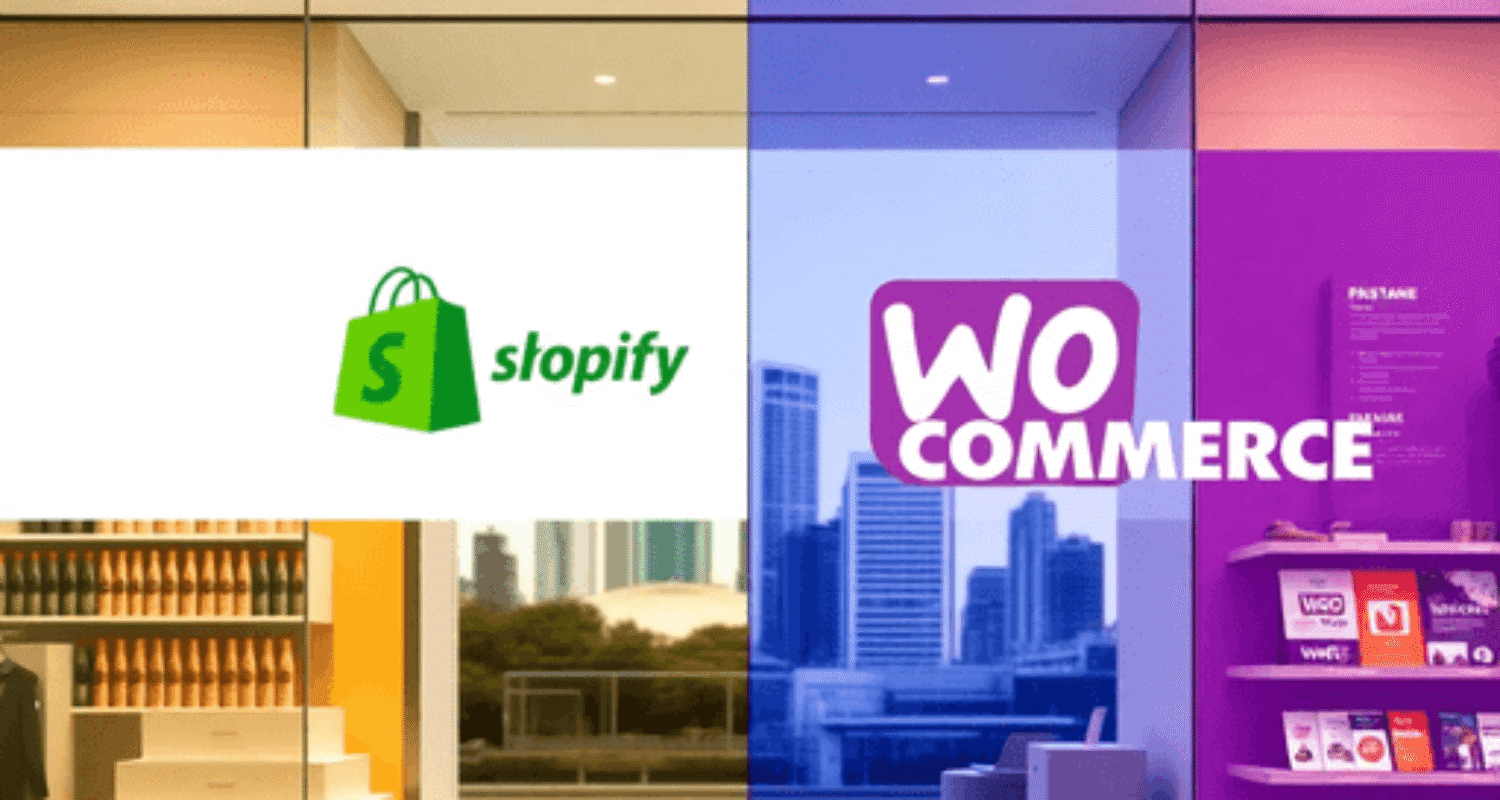Brisbane retailers face a crucial decision when launching or upgrading their online stores: Shopify vs WooCommerce. Both platforms are leaders in the eCommerce market, each with its strengths, making them popular choices for local businesses looking to boost sales and improve operations.
- Shopify offers a simple, all-in-one solution trusted by thousands of Australian brands for its user-friendliness and excellent support.
- WooCommerce, as a flexible WordPress plugin, gives retailers full creative control, advanced customization options, and seamless integration with existing WordPress sites.
Your choice of platform affects everything from design flexibility to ongoing maintenance. Choosing the right eCommerce solution is not just about features—it’s about ensuring your business can grow, compete, and succeed in Brisbane’s ever-changing retail landscape.
Key takeaway: The right platform can make or break your online store’s success. This guide compares Shopify vs WooCommerce for Brisbane retailers, highlighting key differences so you can make an informed decision tailored to your business goals.
Understanding Shopify and WooCommerce
Shopify: The All-In-One Solution
Shopify stands out as a fully hosted eCommerce platform, removing the technical barriers for retailers who want an all-in-one solution. Everything from web hosting to security, PCI compliance, and updates is managed for you.
This hands-off approach means you can focus on growing your business rather than dealing with server issues or complex backend configurations. The platform’s interface is designed for simplicity, allowing even first-time users to set up a professional online store quickly.
The Shopify App Store brings thousands of integrations—covering everything from marketing automation to inventory management—so expanding your store’s capabilities is just a few clicks away.

WooCommerce: The Customizable Plugin
WooCommerce offers a different proposition. Built as a powerful plugin for WordPress, it transforms any website into a customizable online store.
Its open-source nature gives you full control over design, features, and data. You’re not boxed into pre-set templates or proprietary limitations; instead, every aspect of your store’s functionality can be tailored to match your brand and operational needs.
WooCommerce integrates seamlessly with the vast WordPress ecosystem, providing access to countless themes and plugins for advanced SEO, social media integration, and content marketing—an advantage for Brisbane retailers focused on long-term organic growth.
| Feature | Shopify Features | WooCommerce Features |
|---|---|---|
| Hosting | Fully hosted by Shopify | Self-hosted (you choose your provider) |
| Customization | Limited backend access; theme-based customization | Full code access; unlimited customization |
| App/Plugin Ecosystem | Extensive app marketplace | Integrates with WordPress plugins |
| Ease of Use | Drag-and-drop builder; minimal setup | Requires WordPress knowledge; more steps to launch |
Both platforms are widely adopted by businesses in Brisbane due to their unique strengths, supporting local entrepreneurs across industries and growth stages.
1. Customization and Flexibility
WooCommerce customization stands out for Brisbane retailers seeking total control over their online store’s design and features. Built as a WordPress plugin, WooCommerce allows you to:
- Edit every aspect of your storefront, from layouts and color schemes to checkout workflows.
- Leverage thousands of free and premium WordPress themes, or create a bespoke design tailored to your brand.
- Extend functionality with an extensive library of plugins covering advanced product filters, loyalty programs, local payment gateways, and more.
- Access the backend code directly, enabling custom development for unique business requirements.
This level of flexibility means you can build anything—from minimalist boutiques to complex multi-vendor marketplaces—without hitting rigid platform limits.
Shopify takes a different approach, prioritizing usability with its drag-and-drop editor and polished theme marketplace. You’ll find:
- Professionally designed templates that are easy to customize with your branding elements.
- The ability to tweak fonts, colors, images, and page layouts without coding knowledge.
- An app ecosystem offering additional features like reviews, shipping integrations, or marketing tools.
However, Shopify flexibility has boundaries. Direct access to backend code is restricted; advanced modifications often require Shopify’s Liquid templating language or paid third-party apps. This ensures stability but can limit highly customized workflows compared to what’s possible through WordPress integration with WooCommerce.
Retailers must weigh the importance of creative freedom against ease of use when selecting their eCommerce solution.
2. Hosting and Maintenance
Shopify operates as a fully hosted platform, which means you don’t need to worry about servers, security patches, or manual updates. For Brisbane retailers, this translates to less time spent on technical website maintenance and more time focused on growing your business. Shopify’s team handles all server management, uptime monitoring, and software updates in the background. Whenever an update rolls out—whether for security, performance, or features—your store stays current without effort from your side.
WooCommerce, in contrast, is a self-hosted solution built on WordPress. You select your hosting provider, which opens up greater flexibility and control over server resources, performance tuning, and security configurations. Brisbane businesses can choose local web hosts that understand the nuances of Australian traffic and compliance needs. This level of control appeals to retailers who want tailored server environments or specific compliance protocols.
However, self-hosting brings added responsibilities:
- Regular software updates for both WordPress and WooCommerce plugins.
- Security monitoring to prevent hacks or malware infections.
- Backups to protect critical business data.
- Performance optimization as your site grows.
For those seeking hands-off convenience with minimal technical involvement, Shopify stands out among hosted platforms. Retailers prioritizing granular control and custom infrastructure may find WooCommerce’s self-hosted approach more fitting—provided they are prepared for ongoing website maintenance in Brisbane’s competitive market.
Shopify vs WooCommerce for Brisbane retailers often comes down to the trade-off between simplicity and autonomy in how your online store is managed behind the scenes.
3. Performance and Scalability
When it comes to website performance, scalability, and Core Web Vitals improvement, Shopify stands out for its superior site speed and stability. This is primarily due to its fully hosted environment, which ensures that all technical aspects are optimized for peak performance. Many Brisbane retailers have reported significant improvements in their website metrics after migrating from WooCommerce to Shopify. These improvements often include faster load times, reduced downtime, and enhanced user experiences.
Case Study: Migration Impact
Retailer A experienced a 40% decrease in page load time and a notable increase in site stability after transitioning from WooCommerce to Shopify. This resulted in higher customer retention rates and improved overall sales performance.
On the flip side, the scalability of a WooCommerce store is largely contingent on the quality of its hosting provider and the expertise of its developer. High-performing WooCommerce websites rely on robust server configurations and continuous optimization efforts by skilled developers. While this provides more control over the fine-tuning of your site, it can also result in increased maintenance efforts and potential technical challenges.
For Brisbane retailers looking for a platform that offers reliable performance with minimal hands-on management, Shopify is an attractive option. However, if you prefer having extensive control over your site’s architecture and are prepared to invest in high-quality hosting and development resources, WooCommerce can be equally effective.
4. SEO Capabilities
Getting visibility in a competitive market like Brisbane starts with strong SEO foundations. WooCommerce offers robust SEO potential due to its seamless integration with WordPress—one of the most search engine-friendly platforms available. You gain access to a wide range of powerful plugins such as Yoast SEO, All in One SEO, and Rank Math, allowing you to fine-tune everything from meta titles and descriptions to advanced schema markup. This level of control is critical for retailers prioritizing SEO Brisbane strategies and aiming for keyword domination.
WooCommerce SEO Benefits
- WooCommerce SEO compliance also means you can leverage custom URL structures, XML sitemaps, redirects, and detailed content optimization—all directly within your WordPress dashboard.
- With WooCommerce, technical users can edit .htaccess files or utilize advanced caching plugins for site speed improvements, further enhancing rankings.
Shopify SEO Benefits
Shopify simplifies the process with built-in Shopify SEO features designed for ease of use. Every Shopify store comes optimized out-of-the-box with clean code, mobile-friendly themes, automatic sitemap generation, and SSL certification. For those wanting more control, Shopify’s App Store offers third-party options like Plug-in SEO or Smart SEO that extend on-page optimization capabilities.
Both platforms can drive serious search visibility—WooCommerce rewards those ready to dig deeper into customization, while Shopify appeals to retailers seeking reliable, automated tools with minimal manual setup.
Keeping a sharp focus on local searches and long-tail keywords ensures either platform supports your ambitions for higher Google rankings in the Brisbane retail sector. To master such advanced local SEO strategies, it’s essential to stay updated with the latest trends and techniques specifically tailored for Brisbane businesses in 2025.
5. E-commerce Functionalities
When comparing Shopify vs WooCommerce for Brisbane retailers, the range of e-commerce functionalities provided by each platform plays a major role in day-to-day business operations.
Inventory Management
- Shopify delivers a robust, out-of-the-box inventory management system. You can easily track stock levels, set automatic restock alerts, and manage multiple product variants without requiring additional plugins.
- WooCommerce, while highly customizable, often requires third-party plugins for advanced inventory features. Core inventory tracking is reliable but scaling up to support multi-warehouse setups or complex SKUs typically involves extra add-ons.
Order Tracking & Fulfillment
- Shopify includes native order tracking, customer notifications, and an integrated dashboard for managing the fulfillment process from start to finish. Shipping label creation and real-time status updates are available without any coding.
- WooCommerce offers basic order management tools within WordPress. For advanced order tracking or automated notifications, you’ll likely rely on popular extensions such as WooCommerce Shipment Tracking or integrations with third-party logistics providers.
Multi-Warehouse Support
- Shopify supports multi-location inventory management directly within its admin, making it straightforward for retailers operating across Brisbane suburbs or interstate warehouses.
- WooCommerce can handle multi-warehouse workflows via specialized plugins like ATUM Inventory Management or WooCommerce Multi Locations Inventory Management, though these require careful configuration and regular maintenance.
For Brisbane retailers juggling diverse product ranges or multiple physical locations, evaluating how each platform streamlines daily operations can reveal which solution best fits your business workflow.
Both platforms deliver essential commerce features—how they integrate and scale with your growth ambitions is where their differences stand out.
Considerations for Brisbane Retailers When Choosing Between Shopify and WooCommerce
Local expertise plays a critical role when running an online store in Brisbane. Having access to Brisbane developers ensures that any technical issues or platform-specific customizations can be resolved quickly and efficiently.
Shopify agencies Brisbane
These agencies often provide rapid troubleshooting, hands-on launch support, and ongoing maintenance packages. Their experience with the Shopify ecosystem means quick adaptation to Australian payment gateways, tax systems, and shipping integrations.
WooCommerce developers Brisbane
Specialized WooCommerce developers are in demand among retailers who want tailored solutions. They can create bespoke plugins, optimize performance for local audiences, or integrate advanced features specific to your niche—whether you run a boutique fashion store or a large electronics outlet.
The ability to collaborate with local professionals means smoother communication, faster turnaround times for updates, and solutions that align with Brisbane’s market trends. Working with developers who understand regional consumer behavior also helps your store stand out in a competitive digital landscape.
Budget Constraints & Resource Allocation Needs
When comparing Shopify and WooCommerce, the cost structure is crucial for small businesses in Brisbane with limited budgets.
WooCommerce (Self-Hosted):
- Initial Development Cost: Lower if you have in-house expertise, but hiring a developer or agency can increase upfront investment.
- Ongoing Maintenance: Requires regular updates, security monitoring, and potentially higher maintenance costs if issues arise.
- Hosting Fees: You pay separately for hosting, which offers flexibility but adds a recurring expense.
- Add-ons and Plugins: Many essential features require paid extensions, making costs variable.
Shopify (Subscription-Based):
- Monthly Subscription Fee: Predictable pricing starting from basic plans up to advanced tiers.
- Hosting Included: Removes the need to budget separately for hosting or server maintenance.
- App Costs: While many tools are included, some advanced ecommerce functionalities require additional monthly fees.
These different pricing models affect cash flow and resource allocation strategies. In the competitive Brisbane market, understanding these ecommerce platform development costs enables smarter budgeting decisions that match your business’s growth stage and operational readiness. Small businesses often find Shopify’s predictable costs appealing for financial planning, while WooCommerce appeals to those prioritizing control and customization despite more hands-on management.
Aligning Your Business Goals With Desired Features From An Ecommerce Platform
Identifying your retail business goals and feature requirements ecommerce platform is critical for Brisbane retailers weighing Shopify vs WooCommerce. Each platform brings distinct advantages depending on your growth trajectory and operational needs.
1. Automation and Scaling
If automating order processing, inventory sync, or marketing campaigns is essential for scaling, Shopify’s robust ecosystem of built-in automation tools and third-party apps can streamline operations as your sales volume grows. Automation empowers you to focus on business expansion instead of manual admin.
2. Niche Market Domination
WooCommerce offers granular control over every aspect of your site, making it ideal for businesses targeting unique markets with custom workflows or distinctive storefront experiences. Integrations with WordPress plugins give you the flexibility to implement advanced SEO tactics, specialized content strategies, or tailored conversion funnels.
3. Feature Matching
Make a list of must-have features—such as advanced analytics, multi-channel sales capabilities, or custom checkout flows—then map them against platform strengths. For example, Shopify excels in rapid deployment and reliability for high-traffic stores; WooCommerce thrives on deep customization and integration with existing WordPress sites.
Aligning your platform choice with your vision ensures technology supports both immediate needs and future ambitions as the Brisbane retail landscape evolves.

Case Studies: Successful Migrations From WooCommerce To Shopify By Local Businesses
Several Brisbane retailers have reported impressive ecommerce success stories after migrating from WooCommerce to Shopify. Here are some notable examples:
- Local boutique fashion stores achieved a 25% increase in conversion rates within three months of switching platforms.
- One specialty retailer saw their monthly revenue grow by 40%, citing Shopify’s streamlined checkout and integrated analytics as key drivers.
These migrations highlight how the right platform can fuel revenue growth and create measurable improvements in ecommerce performance for Brisbane businesses.
Challenges Faced By Small Businesses In Brisbane When Using Different Ecommerce Platforms
Small businesses in Brisbane often face several challenges when using ecommerce platforms. Limited resources allocated towards digital marketing efforts can result in poor online visibility, making it difficult to attract and retain customers. Common issues include:
- Digital Marketing Expertise: Many small business owners lack the necessary expertise to effectively market their products online, leading to underperformance in search engine rankings and social media reach.
- Website User Experience Problems: Poor website design and user experience can deter potential customers, decreasing conversion rates and overall sales.
- Resource Constraints: Small businesses frequently struggle with limited budgets, making it challenging to invest in advanced features or hire professional developers for customization and maintenance tasks.
Understanding these challenges helps Brisbane retailers make informed decisions when choosing between Shopify and WooCommerce, ensuring they select a platform that aligns with their capabilities and goals.
How Small Biz Optimize Can Support You Throughout The Entire Process
Small Biz Optimize services are tailored specifically towards helping Brisbane retailers select the best-fit eCommerce solution, implement it effectively, and optimize thereafter. Our expertise spans across various key areas:
- Website Design/Development/Management: Crafting visually appealing and high-performing websites that cater to your business needs.
- SEO Strategies: Enhancing your online visibility with data-driven SEO techniques aimed at improving local search rankings.
- Online Reputation Management: Building and maintaining a strong brand presence in the digital space.
- Building Brand Authority: Creating compelling content and employing effective marketing tactics to establish your brand as an industry leader.
Whether you are considering Shopify or WooCommerce for your Brisbane retail business, our team at Small Biz Optimize provides comprehensive support throughout every stage of your eCommerce journey.
Conclusion
Choosing the best-suited eCommerce platform is essential for Brisbane retailers to ensure a successful online presence. This comparison of Shopify vs WooCommerce for Brisbane retailers has highlighted the key differences and advantages of each platform.
- Shopify offers ease of use, a fully hosted environment, and scalability.
- WooCommerce provides customization flexibility and seamless WordPress integration.
To move forward with your decision-making process:
- Consider reaching out to us at Small Biz Optimize for expert consultation.
- Conduct further research on both platforms.
- Evaluate how each aligns with your business goals and budget constraints.
Taking these steps will help you make an informed choice that supports your long-term growth.
FAQs (Frequently Asked Questions)
What are the main differences between Shopify and WooCommerce for Brisbane retailers?
Shopify is a fully hosted eCommerce platform known for its ease of use and extensive app ecosystem, offering user-friendly templates but limited backend access. WooCommerce, integrated with WordPress, provides greater customization and flexibility, allowing complete control over website design and functionality but requires self-hosting and more hands-on maintenance.
How does hosting and maintenance differ between Shopify and WooCommerce for Brisbane businesses?
Shopify offers a fully hosted environment that simplifies maintenance and updates, ideal for Brisbane retailers seeking hassle-free management. In contrast, WooCommerce is a self-hosted solution giving businesses control over server choices but requiring them to manage hosting, security, and technical upkeep themselves.
Which platform offers better performance and scalability for growing Brisbane eCommerce stores?
Shopify excels in site speed, stability, and scalability as evidenced by migration case studies showing improved Core Web Vitals scores after switching from WooCommerce. WooCommerce’s scalability depends heavily on the quality of hosting providers and developer expertise, making it suitable for businesses with technical resources.
What SEO capabilities do Shopify and WooCommerce provide to Brisbane retailers?
WooCommerce offers strong SEO potential through seamless WordPress integration and numerous SEO plugins, enhancing search engine visibility. Shopify includes built-in SEO tools and supports third-party apps to boost SEO performance, making both platforms viable options depending on your SEO strategy.
How important is local developer support in choosing between Shopify and WooCommerce in Brisbane?
Access to local developer support is crucial for customization and resolving technical issues promptly. Brisbane has specialized WooCommerce developers who can tailor solutions to specific business needs as well as Shopify agencies experienced in optimizing stores for the local market.
What should small businesses in Brisbane consider regarding budget when choosing between Shopify and WooCommerce?
Shopify operates on a subscription-based pricing model simplifying budgeting but may have ongoing fees. WooCommerce involves self-hosting costs plus potential expenses for development and maintenance. Small businesses should evaluate the total cost of ownership, including development, hosting, and resource allocation within competitive markets like Brisbane.




